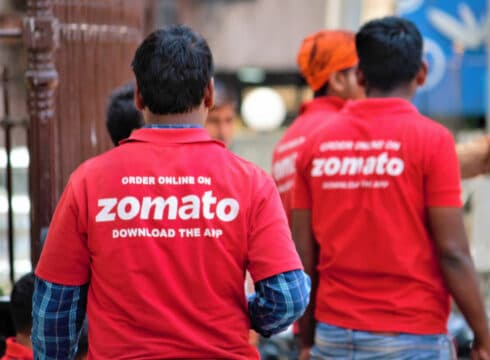In a report published by Zomato, the company said that the food delivery industry was clocking 75-80% of pre-Covid GMV
The dining out industry is operating at 8-10% of pre-Covid levels
In cities where lockdown restrictions have been lifted, only 17% dining out establishments are open for business
Inc42 Daily Brief
Stay Ahead With Daily News & Analysis on India’s Tech & Startup Economy
Indian foodtech unicorn Zomato, on Wednesday, said that the food delivery industry had largely recovered, with the sector clocking around 75-80% of pre-Covid GMV (gross merchandise value).
In a report shared by Zomato, the company said that it had surveyed thousands of restaurants and customers to gain an understanding of the current state and future outlook for the restaurant industry. The findings of the report majorly relate to two key components of the restaurant industry — food delivery and dining out. According to the report, the food delivery business is poised for a strong comeback, with customers living in residential areas of the big cities no longer fearing contagion from food delivery. While restaurants offering food delivery had recovered 70% of their pre-Covid volume, 5% of these are restaurants which previously did not offer the service. These were dining-out centric restaurants which showed the agility to pivot their business to food delivery during the lockdown, and are reaping the fruits of their timely decisions.
Other interesting insights from the report suggest that with many people working from home, those living in big cities have left for their hometowns, and are now ordering from Zomato from these Tier 2 and Tier 3 cities. One in every five Zomato customers in metros (pre-COVID) have opened their app from a smaller town recently. Out of these relocated folks, one third have already started ordering food again from their new location.
The report said that once a customer overcomes the hesitancy and fear of contagion from food delivery and places the first order, the subsequent order frequency is the same as pre-Covid. Fears of Covid-19 transmission through food delivery were accentuated after a pizza delivery boy in Delhi tested positive for the virus. The delivery boy had been showing Covid-19 symptoms for 20 days, while he was making food deliveries. After he tested positive, authorities placed 72 families, whom he had visited for food deliveries, under home quarantine. The members of these households weren’t placed under institutional quarantine as none of them had shown any symptoms of the infection. The delivery boy had made some deliveries for orders placed through Zomato. After the news broke, Zomato issued a clarification informing people of the safety precautions the company was asking its delivery boys to take, to minimise the risk of transmission.
“Zomato has delivered 7 crore food orders since lockdown started on March 25th. We estimate that between other food aggregators and direct restaurant channels, Indians have ordered 20 crore times since the lockdown. There have been zero reported cases of COVID transmission due to food delivery,” the Zomato report said.
The dining out industry is bearing the larger brunt of the Covid-19 pandemic and the resultant lockdown. Fears of virus transmission while dining out have meant that the industry is operating at 8-10% of pre-Covid levels. “Slump in the industry is largely driven by markets being in lockdown, consumers not stepping out due to fear of transmission and restaurants not opening up, even if the city is not in lockdown,” the report said.
The pandemic’s effect could mean that the dining out industry won’t be able to recover its business in the foreseeable future. The report noted that even in cities where lockdown restrictions have been lifted, only 17% of dining out restaurants are open for business. Of the 83% that are shut, 10% have shut permanently while another 30% could still close down.
“60% restaurateurs said they estimate to retain less than half of their original business volumes for a few months even post-COVID,” the report stated.
Zomato & Swiggy Announce Layoffs
In July, while announcing layoffs for 350 executives, Indian foodtech unicorn Swiggy said that the food delivery industry had recovered just about 50% of its pre-Covid levels. “In May, we began the exercise of realigning resources to create capacity in higher potential areas with the optimism of the business attaining pre-covid levels in the near-term. However, with the industry still only having recovered to about 50% of its peak, we have to, unfortunately, go ahead with this final realignment exercise, which will result in the net loss of 350 jobs. We are concluding the exercise we began late May and there are no plans for any further restructuring,” a Swiggy spokesperson had told Inc42.
Zomato too, laid off 13% of its workforce, translating to around 5000 employees in May, as its food delivery business underwent a slump due to the pandemic. In an analysis of Zomato’s annual report released in July, Inc42 found that FY 2020-21 could bring a 54-58% revenue drop for the company.
Both Zomato and Swiggy entered the grocery delivery business earlier this year, with Zomato Market and Swiggy Stores respectively. However, two months after launching its grocery delivery business in 80 cities in April, Zomato shut it down, reportedly after finding that the business was not scalable. Swiggy still operates Swiggy Stores, and recently launched InstaMart, for delivery of groceries and other household items within 30-45 minutes of the customer placing the order. The company is piloting the service in Gurugram.
{{#name}}{{name}}{{/name}}{{^name}}-{{/name}}
{{#description}}{{description}}...{{/description}}{{^description}}-{{/description}}
Note: We at Inc42 take our ethics very seriously. More information about it can be found here.


